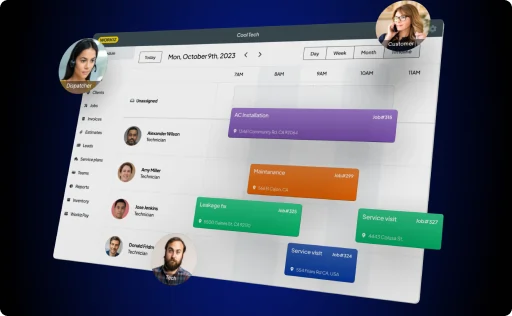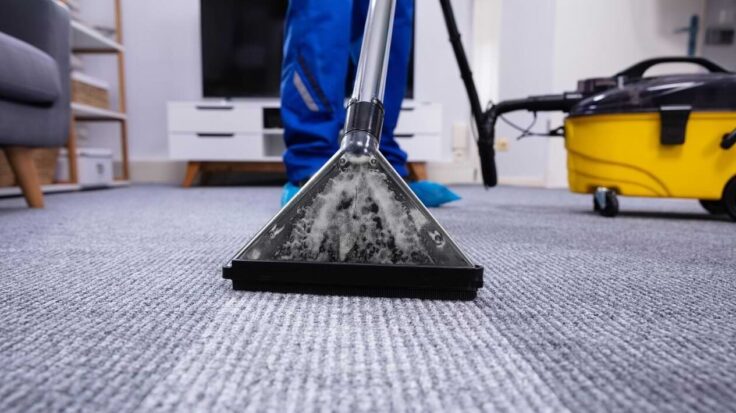More often than not, field service pros tend to think that the most important part of their job is providing excellent quality work and doing a good job in their chosen field. So if you’re a plumber, that means unclogging drains and replacing piping with expertise. If you’re a carpet cleaner, that means cleaning the carpet to sparkling perfection, etc. That makes sense, right?
You take pride in your work and in your carefully honed professional skills. But, hear us out, field service pros. Was there ever a time when you did amazing work, and you received a bad review? Probably.
We all know that reviews can make or break our business. So, here’s a little-known secret that’s going to change the way you interact with your customers and run your business: Your customers care more about the level of service they’re getting – and not just about the service itself. Yes. It’s true.
Don’t believe us? Let’s check out a few customer reviews on popular review sites to see exactly what we’re talking about (we’ve redacted all identifying information to ensure customer and company privacy.)
Here’s what your customers REALLY care about – in their own words
Review #1

What caught our eye:
- The field service pro was honest and professional
- Created trust
- Assessed the problem and came up with the best way to fix it
- Transparent about the job, work required, and the method they used to fix the issue
- Has done several jobs for the customer
Review #2

What caught our eye:
- Field service pro broke their commitment
- Didn’t communicate delays/need to reschedule
- Customer was ghosted
- The customer’s trust was breached, and no longer trusts the company
Review #3

What caught our eye:
- The field service pro was friendly
- The job was perceived as dirty/difficult by the customer
- Showed up on time
- Kept customer updated on work and progress
Review #4

What caught our eye:
- The field service pro was on-time and friendly
- Same day service
- Easy and fast service
- Very good at what they do
- The field service pro seems honest (don’t try to sell you something you don’t need)
- Will recommend the service to friends
- High chance they will reschedule with this company
Review #5

What caught our eye:
- Exceeded customer expectations with same-day service
- Efficiently booked service with little hassle
- Polite
- Arrived early, and waited until the customer was ready
- Helped customers with work beyond the job description
Notice something interesting about these reviews? Because we did….
Most of the feedback left isn’t about the work performed – it’s about the level of service provided to customers and managing their expectations of customers. Or in other words: Your customers care just as much, if not more, about the customer experience you provide them with as the job you’re actually sent out to.
Don’t believe us? Take a look at any popular review site and see what customers are actually writing. Most of the comments left will be about the service level you offered and not about the actual job itself. Now, here’s why.
Customers lack the technical knowledge to rate your job performance
More real talk: Most customers aren’t all that technically sophisticated. Otherwise, they’d actually be doing the job themselves. Unless a customer professionally studied plumbing or roofing, they usually have no way to tell if a service professional really is “a true professional” or really did find the “best way to fix” their issue.
For example, a customer has no idea if you’ve used the most top-of-the-line piping or the cheapest piping that will fall apart in a year. Because of this, customers tend to rate your service based on the things that they can judge and criteria that they do understand.
At Workiz, we call this the “non-work criteria.” So what does this “non-work criteria” include?
When it comes to job performance: Customers only notice what you tell them to
This is especially true in field service jobs that are “under-the-hood.” Think electricians, plumbers, alarm and security repair services, appliance repair, etc. Customers don’t have the technical skill or know-how of how professional your work actually is. But-
Customers will notice a job well done if it’s pointed out to them. How do you do this? Transparency. Don’t assume they know about the job you’re doing. Describe the difficulty level and the possible courses of action. Involve your customers. Describe why you’re choosing to go the route that you are. Answer any questions that they may have along the way. Yes, it might seem annoying at first, but this is necessary. Why? Well, because you’re marketing yourself and your professional expertise to your customers. Make sure your customers know what you do and remember what you do.
The “non-work criteria” that customers use to evaluate service
This is especially true in field service jobs that are “under-the-hood.” Think electricians, plumbers, alarm and security repair services, appliance repair, etc. Customers don’t have the technical skill or know-how of how professional your work actually is. That being said-
Customers will notice a job well done if it’s pointed out to them. How do you do this? Transparency. Don’t assume they know about the job you’re doing. Describe the difficulty level and the possible courses of action. Involve your customers. Describe why you’re choosing to go the route that you are. Answer any questions that they may have along the way. Yes, it might seem annoying at first, but this is necessary. Why? Well, because you’re marketing yourself and your professional expertise to your customers. Make sure your customers know what you do and remember what you do.
1. Punctuality
We live in a time-oriented culture. Especially when it comes to field service, your customers often stay home from work or rearrange their schedules in order to receive service. So, if you tell a customer you’ll be there at 3:00 p.m. on Tuesday, you’re expected to arrive on time. If you’re not going to be on time, you’re expected to communicate with customers about your delays and estimated time of arrival and definitely never ghost a customer.
2. Excellent communication
Customers notice and appreciate excellent communication. This means communicating any delays you might be experiencing or even phoning a customer to tell them you can’t take a job. Customers expect an open line of communication. This also includes being transparent about your work, possible courses of action, why you’ve chosen that route of action, and the benefit to the customer. But remember, communication isn’t just a one-way street. This also means taking the time to listen to the customers and their needs. Remember that all of this benefits not only the customer – but you.
3. A seamless booking experience
If there’s anything that customers hate, it’s the run-around. Customers shouldn’t have to train as a bounty hunter in order to reach you, get you to call them in order to book a job or receive services. This means streamlining the process to make it as seamless and pain-free as possible. So what can you do to achieve that and better serve your customers?
Maybe it means automating part of the process so that calls are routed to your cell, instead of the office, if no one picks up the phone after 30 seconds. Or, maybe it means training your dispatch to better understand customer issues so that they can book the tech with the right skills or parts and avoid frustration for the customer. Maybe it means using a field software service to let your customers know that you’re on the way, automating reminder text messages before a scheduled job, and communicating delays to customers if a tech will arrive late to a job. Think about it, then invest in the tools or changes that can make a meaningful difference to your customers and their experience.
4. You’re neat, well-mannered, and approachable
We know, we know. We’re taught that looks shouldn’t matter. But, unfortunately, they do. Appearance matters. Whether you’re coming to a customer’s home or place of business, it’s important to look legitimate, and professional and demonstrate trust with a uniform, a name tag, and a marked car. Being approachable is especially important. If you “look scary,” seem “shady,” or you’re just not approachable, it’s going to reflect poorly in reviews. That means minding your manners and your language, saying “please,” “thank you,” and conducting yourself as professional and appropriate, yet friendly and personable.
5. You seem fair
Rule of thumb: If you treat customers with respect and don’t try to take advantage of them, you can win their trust, loyalty, and repeat business. Clearly communicate price estimates, the possible range of prices the job could end up costing, and the reasons why. It’s also important to back up any advertisements and stand by what you say. Best practices are to avoid advertising that’s confusing, misleading, or subject to customer misinterpretation. This also means not trying to sell products or services that your customers don’t want or don’t need. Practice what you preach, and follow through on your promises, whether it means arriving at a certain time, taking a pre-stated price, etc.
Can you think of ways you can improve the “non-work criteria” that customers use to evaluate your service? Do you agree that customers care more about their overall experience rather than the work that you do? We’d love to hear your thoughts in the comment section below.










